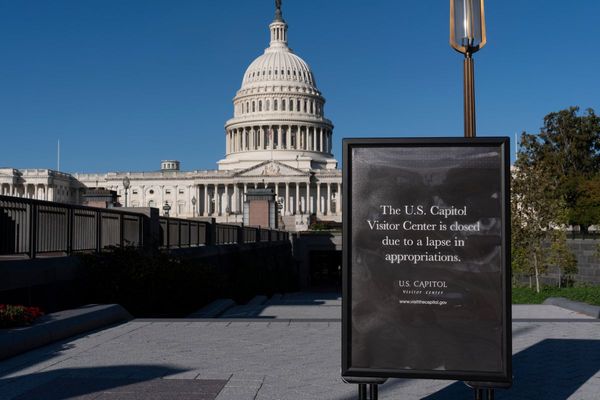
Closing summary: Trump sets negative tone across global markets
Donald Trump is showing no signs of backing away from last night’s imposition of tariffs on Mexican imports into the US: the president has doubled down on his criticisms as morning breaks across America.
Trump also insisted on making a link between trade and immigration, in his latest mini rant on Friday.
Mexico has taken advantage of the United States for decades. Because of the Dems, our Immigration Laws are BAD. Mexico makes a FORTUNE from the U.S., have for decades, they can easily fix this problem. Time for them to finally do what must be done!
— Donald J. Trump (@realDonaldTrump) May 31, 2019
Economists are increasingly weighing up whether Trump’s tariffs will tip the global economy into recession.
Carmakers are particularly in the crosshairs of the levies, which will start at 5% on 10 June. The Alliance of Automobile Manufacturers, the car industry’s powerful lobby group, has heavily criticised the White House’s move, calling it a “tax on our customers” which is harmful to the American economy. Its statement said:
The auto sector – and the 10m jobs it supports – relies upon the North American supply chain and cross border commerce to remain globally competitive. This is especially true with auto parts which can cross the US border multiple times before final assembly.
Any barrier to the flow of commerce across the US-Mexico border will have a cascading effect – harming US consumers, threatening American jobs and investment, and curtailing the economic progress that the administration is working to reignite as efforts are underway to pave the way for ratification of the agreement in Mexico, Canada, and the US Congress.
Ford shares fell by 3%, General Motors lost 4%, and Fiat Chrysler shares are down by 4% at the time of writing. They dragged down the broader US stock market, where the S&P 500 lost 1.1% in its first hour of trading.
And the negative effects of the shock tariff announcement have rippled across the world. London’s FTSE 100 index is one of the better performers of the major European stock indices, down by 0.9% at 7,151 points at the time of writing.

In the final trading session of May, the rush for safety has put US 10-year Treasury yields (which move inversely to prices) on track for their biggest monthly fall since June 2016, when the Brexit vote triggered market ructions around the world.
Meanwhile, German bond yields moved to record lows, further into negative territory, in a sign of investor anxiety over the path of the global economy.
But it wasn’t all bad news: the UK electricity system has officially passed its first fortnight without coal power since 1882. Keep an eye out for the full story on the Business home page.
And here’s another positive headline for your enjoyment as you prepare for the weekend: “Sun and sport to boost UK beer and pizza sales this weekend”.
Thanks for reading in this holiday-shortened week. Please do come back on Monday for more economics, business, and markets (and the visit of one Donald J. Trump to the UK). JJ
Updated
US stocks have fallen, as Wall Street adjusts to Donald Trump’s decision to impose tariffs on Mexico linked to reducing immigration.
The S&P 500 fell by 28 points, or 1%, to 2,760 points. The Dow Jones industrial average fell by 255 points, or 1%, to below 25,000 points, while the Nasdaq composite index fell by 1.2% to 7,475 points.

Ever wonder what David Cameron is up to, as he watches his successor’s final days in office?
As well as writing a book and catching some football, he now has another job for his portfolio: chair of a US artificial intelligence firm.
The former prime minister “will be responsible for curating and overseeing the strategic guidance” the board provides to Afiniti, the company said in a statement.
You can read more here:
While fighting running trade battles with China and Mexico, Donald Trump is coming to town next week. On the agenda: lunch with the Queen, breakfast with the prime minister (Theresa May, that is), and a lot of protests.
Trump has already put the cat among the pigeons with his recent favourable comments about Boris Johnson, the frontrunner to replace May, and Nigel Farage, the leader of the Brexit party.
He could sow further discord with strong words on Huawei: May has taken a more lenient approach to the Chinese telecoms company, and the FT reports (£) that he plans to give the UK an ultimatum on intelligence sharing to try to prevent Huawei technologies from being used.
In his three-day visit to Britain, Trump will attend an event to mark the 75th anniversary of D-Day, with protests expected in Portsmouth.
Protesters are again hoping to fly a nappy-wearing inflatable Trump baby blimp, and a 16ft talking robot of Trump sitting on a gold toilet is also expected to make an appearance.

Companies bidding for public sector contracts will be forced to take radical steps to tackle the climate crisis under new regulations being proposed by the Labour party, addressing energy use, greenhouse gas emissions and waste.
If elected, the party would force suppliers to “put people and planet before profit”, with the threat of losing contracts if they do not, in a stark redrawing of priorities for contract bidders, writes the Guardian’s Fiona Harvey.
You can read more here:

The government has reappointed Ben Broadbent as the Bank of England’s deputy governor for monetary policy, effective from 1 July 2019.
Broadbent will serve until 30 June 2024, meaning he is likely to be deputy governor under his boss Mark Carney’s successor – although Broadbent himself is thought to have an outside chance of being appointed to the top job.
Frances O’Grady, general secretary of the Trades Union Congress, is among three new non-executive directors to the Bank’s court – the body which essentially serves as its board. She replaces Unison boss Dave Prentis.
The government also appointed payments company boss Ron Kalifa and Hanneke Smits, chief executive of Newton Investment Management, to the court. They will all serve four-year terms beginning on 1 June 2019.
Great Britain's electricity system on track for first coal-free fortnight since 1882

At 3:12pm BST precisely the system which serves England, Scotland and Wales will have gone for two weeks without coal, according to the National Grid Electricity System Operator.
We can now confirm that Great Britain’s electricity system will pass the fortnight mark for no coal generation this afternoon! The last coal generator came off the system at 3.12pm on 17th May – meaning we will achieve #coalfreefortnight at 3:12pm today!!
— National Grid ESO (@ng_eso) May 31, 2019
It follows Britain’s first coal-free week, achieved earlier this month as the UK has rapidly moved away from the heavily polluting fuel in favour of gas.
As we approach midday in London the major European stock markets are all in the red.
The FTSE 100 is down by 71 points, or 1%, at 7,146 points, while the mid-cap FTSE 250 is down by 0.9%.
Germany’s Dax and Italy’s FTSE MIB were the hardest hit of the major indices, down by 1.8% each.

An interesting perspective on how China – the true target of Trump’s trade ire – will react to Trump’s fickleness, from Simon Baptist, chief economist at the Economist Intelligence Unit. He said:
Trump’s tariff threats to Mexico are going to make it more difficult to reach a trade deal with China, as they damage the credibility of the US as a negotiating partner. Chinese academics and media have already been pushing the narrative that Trump cannot be trusted, even harking back to never-ending US demands on Japan during their trade war back in the 1980s.
This move against Mexico will just reinforce China’s view that Trump cannot be trusted and that any deal will just be a prelude to more demands. So they will see even less point in trying to reach a deal, and will certainly be less willing to make meaningful concessions as it is hard to see a credible mechanism to bind Trump to any deal.
In some ways this is a mirror of how the apparent change in China’s negotiating position earlier in May undermined US faith in Chinese promises.
Has Trump increased the risk of a global recession?
Paul Donovan, chief economist at UBS Global Wealth Management, likes to characterise tariff increases as tax hikes on consumers – because there is little evidence that the costs are not simply passed on in the form of higher prices.
The proposed tax of 5% rising to 25% on imports from Mexico is a double hit. Mexico had been taking market share from China by selling products from the September 2018 trade tax list. If Mexican goods are taxed, US consumers will find it harder to evade the China trade taxes.
The bigger economic risk is uncertainty. The US economy, and the world economy, has spent a quarter of a century building growth on long, complex supply chains. If those supply chains are at risk, companies will need to rethink their business models.
Reshaping supply chains is an additional and economically unnecessary cost. If investment is cancelled and employment reduced, then the risk of a recession increases significantly.
Investors are starting to realise that there is not going to be a quick resolution to the complex battle for economic hegemony, according to Neil MacKinnon, global macro strategist at Russian investment bank VTB Capital. He said:
Not only does this introduce a fresh set of headwinds for the global economy and increase the risk of a global recession, but it also injects the potential for instability in the international monetary system between the US, the world’s biggest debtor, and China, the biggest official holder of US Treasuries.
In case you missed it last night, there was some interesting corporate news from the US that did not relate to Donald Trump: Uber’s first quarterly report.
The ride-sharing company lost more than $1bn (£790m) in the first three months of the year, writes the Guardian’s Dominic Rushe.
Uber said it now had 93m customers who are active on a monthly basis, 33% higher than the same period last year. The company’s revenues were $3.1bn for the three months, 20% higher but slower than the 25% annual growth Uber recorded in the prior quarter.
The company is spending heavily as it attempts to grow its market and head off rivals including Lyft, which is also losing billions. Investors – and even the company – have worried that Uber may never make a profit.
You can read more here:
Take a look at the Mexican peso today against the US dollar – under severe pressure from Trump’s tariff threat on imports to the USA.
The currency has lost 3.1% so far today, its biggest one-day fall in seven months. One US dollar will now buy 19.7 pesos, the most since the end of last year.

- Also, that near-record low for the German 10-year bund from earlier is now a full record – in case anyone doubted that we live in strange economic times.
Elsewhere on markets, it has been a quiet week for sterling against the euro and the dollar, but the currency is still on track for its worst month since May 2017.
Against the euro the pound is down by 0.3% for the day, but it is down by more than 3% for the month thanks to the political turmoil of losing a prime minister and the possibility her replacement will choose to take the UK out of the EU without a deal.

British government debt is also rallying as investors look for safe havens.
The yield on UK 10-year gilts hit a low of 0.861% – the lowest since October 2016 – as prices rose.
British mortgage approvals stronger than expected in April
UK banks approved 66,261 mortgages in April, a three-month high and more than economists had predicted, according to the Bank of England.
House price data earlier in the day from Nationwide suggested that prices fell during May, but the stronger performance from the comprehensive data from the Bank suggest that the prospects for a sustained fall in prices may be slim.
The pickup – from 62,559 in March – came after the government was forced to delay Brexit from 29 March to 31 October.
Non-mortgage lending to consumers rose by 5.9% in April compared to the same month last year, the smallest increase since June 2014.
British businesses urge Theresa May to put net-zero emissions in law

The early judgements of Theresa May’s achievements as prime minister have not been very kind, to put it rather mildly. But British business leaders have hit on one thing she could do to secure something of a legacy before she resigns on 7 June: put into law the target of net-zero greenhouse gas emissions by 2050.
In a letter sent yesterday to the outgoing prime minister, bosses from a host of major companies, from BT, Coca-Cola, Iceland, Legal & General, Sainsbury’s and John Lewis have urged the government to “act immediately to put in legislation the Committee on Climate Change (CCC)’s recommendation for a UK 2050 net-zero greenhouse gas emissions target.”
The measure would be likely to gain a majority in parliament if backed by the government. Business secretary Greg Clark has previously said the government is “on a path” to legislating for the net zero target.
However, a new Conservative party leader might put the carbon emissions target – which would require significant regulation – on the back-burner.
The letter to the PM said:
By being the first major economy to legislate an ambitious, domestically achieved net-zero target supported by a comprehensive policy package, the UK can show leadership on a global level while strengthening the UK economy. This action would position the country as a strong host, as the UK bids for COP 26 – a critical moment in global action to tackle climate change and an opportunity to leave a legacy of clean growth across the UK.
We are doing this because we see the threat that climate change poses to our businesses and to our investments, as well as the significant economic opportunities that come with being an early mover in the development of new low-carbon goods and services. But we need effective, long-term policies to support the investment and innovation required if the UK is to accelerate the necessary transition and ensure it is delivered fairly.
On a side note, some environmentalists may balk at the inclusion among the signatories to the letter of the UK boss of oil supermajor Shell, the chief executive of Heathrow Airport, and the chief executive of Energy UK, which counts multiple fossil fuel extractors among its members.

Whitbread, the owner of hotel chains such as Premier Inn, has announced a plan to return another £2bn to shareholders through a share buyback.
Fresh from the £3.9bn sale of the Costa Coffee chain to Coca-Cola in August, the FTSE 100 company in February announced plans to give back £2.5bn to shareholders.
Italy’s GDP growth has been revised down for the first quarter, underlining the predicament faced by the eurozone’s third-largest economy.
The economy expanded by only 0.1% in the first three months of the year, statistics agency Istat said.
#Italy #GDP Growth Rate QoQ Final at 0.1% https://t.co/4KYXd8Q0GK pic.twitter.com/OJfcplFrui
— Trading Economics (@tEconomics) May 31, 2019
Year-on-year the economy shrank by 0.1%, Istat said, after Italy fell into technical recession in the second half of last year.
It does not provide an encouraging backdrop for the Italian government’s plans to take a stand against the EU on running an expanded budget deficit (against EU rules).
Deputy prime minister Matteo Salvini (the far-right politician who holds the balance of power) has made noises about loosening the fiscal taps after his League party came top of the European parliament elections.
Indeed, there are now European sovereign bonds worth €3.71tn which have negative yields, according to bond trading platform Tradeweb.
That means 48% of all European sovereign debt is negative-yielding, the highest since September 2016.
The flight to quality following Trump’s tariff shock has added to a bond market rally, with yields on German 10-year bunds moving to almost match the record lows hit in the aftermath of the Brexit referendum in June 2016.

The 10-year bund yield, which moves inversely to its price, went as low as -0.201% on Friday morning, within a whisker of the -0.204% hit on 6 July 2016.
Investors have essentially been paying for the pleasure of lending to the German government (the implication of negative yields) off and on since March. The strange situation also happened for months following the Brexit vote.

Germany’s Dax index is generally more export-sensitive than other indices. It also has major carmakers BMW, Daimler and Volkswagen, all of whom have plants in Mexico.
The index is down by 1.4%, worse than the 0.9% fall on London’s FTSE 100. Volkswagen shares are down by 2.9%, Daimler by 2.1% and BMW by 2%.
Back on Trump, the car industry will be one of the hardest hit by the president’s decision to impose tariffs on Mexican imports to the US.
The Stoxx index tracking automotive manufacturers and suppliers is down by 2.7% in reaction to the announcement, below the 1% fall on the broader Stoxx 600.
“It is brutal news for autos, manufacturing and retail,” said Glenn Reynolds and Kevin Chun, analysts at credit market research firm Creditsights.
The main event in the import-export flow as always is autos, and the two-way traffic of imported parts and finished vehicles is far more complicated than a blanket import tax might take into account. Many US operations depend on that parts flow (coming and going).
To illustrate how the car industry will be in the crosshairs, take a look at the below table from Creditsights of the top imports from Mexico to the US. I’ve marked up the items which are directly part of the sector – it dominates.

The avoidance of a no-deal Brexit at the end of March may have provided some support to housing market activity.

However, Howard Archer, chief economic advisor to the EY Item Club, said any relief in uncertainty for the market will be limited in both size and length.
Certainly, latest survey evidence on the housing market remains largely downbeat.
We believe with Brexit being delayed until 31 October – and it currently very unclear what will happen then – and the domestic UK political situation volatile, prolonged uncertainty will weigh down on the economy and hamper the housing market.
Consumers may well be particularly cautious about committing to buying a house, especially as house prices are relatively expensive relative to incomes. Also it looks questionable whether the labour market and earnings growth will sustain their recent strength as companies tailor their behaviour to a relatively lacklustre domestic economy, prolonged Brexit uncertainties and a challenging global environment.
Let’s get some reaction to the Nationwide data showing that house prices fell in May (before diving back in to the Trump-Mexico standoff).
Prices have hovered near the same level for a year or so now, according to Nationwide’s data.

Samuel Tombs, chief UK economist at Pantheon Macroeconomics, said that the trend in UK house prices remains flat, but he still expects year-on-year price growth to accelerate to 1.5% by the end of the year.
The trend likely won’t improve in the next couple of months, given the political deadlock in Westminster. [...] Nonetheless, consumers’ confidence recovered in May, while the labour market remains robust, with official vacancy data still pointing to steady growth in employment ahead.
In addition, mortgage rates have held steady for low LTV [loan-to-value] loans and have fallen steadily over the last year for high LTV products, improving the attractiveness of house purchases for first-time buyers. The recent fall in interest rate expectations – 20bp over the last month at the five-year horizon – should feed through to mortgage rates over the coming months.
European markets are in retreat as investors take in the prospect of another round of trade anxiety – this time on the relationship between the US and Mexico.
The FTSE 100 fell by 60 points, or 0.8% at the open to 7,154 points.
Italy’s FTSE MIB index, Spain’s Ibex and France’s Cac 40 all lost 1% in early trading. Across Europe the Stoxx 600 fell by 0.5%.
UK house prices fell by 0.2% in May

The British housing market cooled in May, with economists expecting the market to remain flat in the coming months.
Annual house price growth slowed to 0.6%, while prices fell 0.2% month-on-month, after taking account of seasonal factors, said Nationwide, the UK’s largest building society.
The average house price across the UK is now £214,946, Nationwide said, only £26 more than the same point a year ago.
Introduction: Donald Trump links Mexico tariffs to immigration clampdown
Good morning, and welcome to our rolling coverage of the world economy, the financial markets, the eurozone and business.
Donald Trump has come under intense pressure in recent days, after special investigator Robert Mueller made it clear that he was not confident that the US president had not committed a crime in obstructing justice. What better way to distract from that than dropping a bombshell announcement on trade?
In an evening move that took investors by surprise, Trump tweeted that he will impose a 5% tariff on all Mexican imports, gradually increasing to 25% unless illegal immigration into the US stops.
On June 10th, the United States will impose a 5% Tariff on all goods coming into our Country from Mexico, until such time as illegal migrants coming through Mexico, and into our Country, STOP. The Tariff will gradually increase until the Illegal Immigration problem is remedied,..
— Donald J. Trump (@realDonaldTrump) May 30, 2019
....at which time the Tariffs will be removed. Details from the White House to follow.
— Donald J. Trump (@realDonaldTrump) May 30, 2019
Michael Hewson, chief market analyst at CMC Markets, said:
This surprise announcement, coming as it does in the wake of the recent new trade agreement USMCA [US Mexico Canada agreement], was completely unexpected and could well upend the whole agreement.
It also makes it much more difficult for countries to take the US at its word when it comes to trade negotiations if its president can so easily lob a hand grenade into the path of an already agreed deal.
Investors have reacted to the move with a flight to safety. European stock market futures indicate a heavy move downward when market open.
The yield on benchmark sovereign bonds, which moves inversely to prices, fell sharply as investors rushed to buy the safe-haven assets. The yield on the US 10-year bond fell as low as 2.17%, the lowest since September 2017.
Japanese indices fell, with the Topix and Nikkei 225 down by 1.3% and 1.7% respectively. Major Japanese carmakers make a third of their vehicles in Mexico, according to Reuters. Shares in Mazda fell by 7%, while Toyota fell by 3%.
However, Chinese stock markets avoided the worst of the falls, with the CSI 300, which tracks shares in Shanghai and Shenzhen, falling by only 0.2%. That relatively gentle decline came despite purchasing manager index figures which suggested that Chinese manufacturing contracted in May faster than economists had expected.
In the UK, Legal & General today announced it will sell its general insurance business to Germany’s Allianz in order to focus on its core business of retirement savings. The deal will net £242m for L&G.
The agenda
- 9am BST: Italy GDP growth rate final estimate (first quarter)
- 9:30am BST: Bank of England consumer credit (April)
- 9:30am BST: Bank of England mortgage approvals (April)
- 10am BST: Italy inflation rate (May)
- 1pm BST: Germany inflation rate (May)
- 1pm BST: Indian GDP growth rate (first quarter)
Updated







